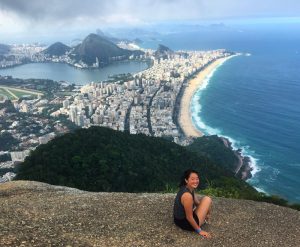
This semester, senior April Hill ’20 worked with Salt City Harvest Farm to conduct environmental audits of food acquisition sites in Syracuse. She helped determine how community gardens may promote food security and cultural preservation among New Americans. This research will support her applications for doctoral nutrition programs, which she plans to pursue in addition to becoming a registered dietitian. Her ultimate goal is to become a research professor at a university. “Currently, I plan to study health disparities and ways nutrition and nutrition programming can be leveraged to combat inequity.”
While this is her most recent research project, it is far from her first. Her freshman year, Hill joined Falk professor Dr. Tanya Horacek on getFRUVED, the healthy campus environmental audit project. It was “one of my most valuable experiences here at Syracuse,” she says. “I learned a lot about conducting research, both in literature and in practice.” And the experience opened the door to even more opportunities for Hill.
Hill was one of ten individuals selected for Iowa State University’s Cyclone Scholar Summer Research Experience, an eight-week research internship during which Hill developed culturally competent diabetes education programming for Black men in the Midwest. “Through this program, I revised the Balanced Living with Diabetes curriculum and organized taste testing trials for a hands-on cooking component of the class. I selected recipes from a special diabetes cookbook, prepared the foods in their learning kitchen, and collected participants’ responses, which I then analyzed using descriptive statistics and presented at the end of the eight weeks.”
During her time there, she also got involved in other exciting research projects with faculty mentors. “This experience was instrumental in my decision to become a research professor. I realized I love doing interactive, qualitative research. I also became especially passionate about recognizing cultural differences in how nutrition education is framed and fighting for equity in all areas as it relates to human nutrition—not just in food access.”
“I don’t think I would have been able to get my assistantship at Iowa State without the experience I gained working with Dr. Tanya Horacek,” she adds.
Hill is a double major in nutrition and citizenship and civic engagement, with a minor in Spanish. “Being a double major has really challenged me to view nutrition from a variety of different lenses, seeing it as a matter of health and social justice.”
As a student, Hill also had the opportunity to study abroad in Santiago, Chile, which “was one of the most rewarding yet challenging experiences of my life,” she says. “I learned about social interactions and societal norms, and how these impact interactions and policies. As far as it relates to nutrition, I gained valuable knowledge about cultural differences to account for when working with diverse populations and how these cultural differences will dictate which strategies will be effective.”
While abroad, she attended classes at La Universidad de Chile, where she dove right into a research project with her fellow students at a local public health clinic. They managed everything, from identifying objectives and strategies to conducting surveys and analyzing the data. They used their research to design a nutrition education campaign aimed at reducing obesity tied to poor nutrition in adolescents. “The research that we did will go on to have real-life implications,” she says. “The students in my group are currently using this report in their other classes to develop nutrition education materials, and this project might even be implemented at the clinic in the future.”
For Hill, receiving Falk College’s Human Dynamics Scholarship helped open the door to Syracuse University and its opportunities. “This scholarship made it possible for me to attend Syracuse University, as well as go abroad and pursue opportunities like my internship at Iowa State,” she says. “These are experiences that have been so formative, especially my abroad semester, and I’m thankful that Falk helped make them possible for me.”
When Hill visited Syracuse University’s campus for the first time as a high school senior, “I remember everyone being really friendly and kind of getting that feeling that I’d just come home,” she recalls. Reflecting on her time here four years later, her first impression proved accurate. “Truly everyone in the nutrition department have been supportive of my life academically, professionally, and socially,” says Hill. “Whether it’s been making me aware of opportunities inside and outside the university or helping us through the dietetic internship or even listening to me talk about things that are bothering me, I really think my professors are what made my college experience what it has been.”
For more information about the Department of Nutrition and Food Studies at Syracuse University’s Falk College, please visit the Falk College website.
